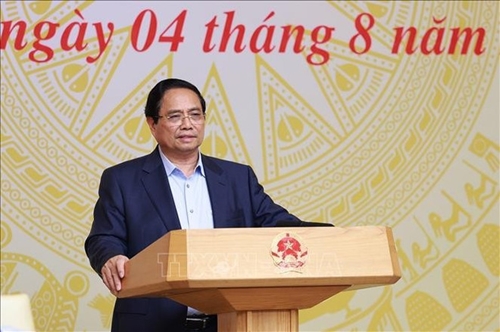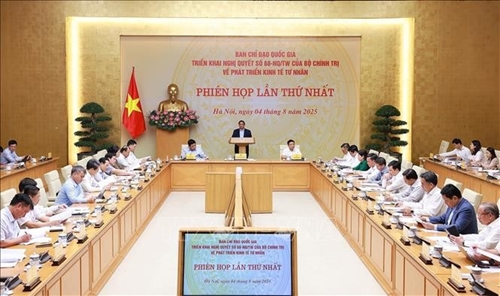As heard at the event, on May 4, the Politburo issued Resolution No.68-NQ/TW. To implement it, the National Assembly (N.A.) adopted Resolution No.198/2025/QH15 outlining special mechanisms and policies to support growth of the private economic sector, followed by the Government’s Resolution No.139/NQ-CP detailing the implementation plan of the N.A.’s document.
    |
 |
|
Prime Minister Pham Minh Chinh speaks at the event. |
Under the Government’s Resolution No.138/NQ-CP on its action plan for executing Resolution 68, a total of 56 tasks have been laid out, while Resolution 139 has assigned 26 additional tasks. Eleven ministries and agencies have been designated as leads, with 17 tasks scheduled for completion in 2025. To date, only six have been completed so the remaining 11 must be fulfilled by the end of the year.
Speaking at the meeting, PM Pham Minh Chinh called on committee members to review, supplement, and execute the assigned tasks and solutions within their authority. He stressed the need to finalize action plans at ministerial, sectoral, and local levels, identify institutional and legal bottlenecks, and propose practical solutions.
He also underlined the importance of assessing how businesses and society perceive these resolutions and the extent of their engagement. The steering committee must propose ways to encourage and enable greater participation from the private sector.
According to recent survey findings, business confidence in Resolution 68 is generally optimistic. However, 50% of surveyed enterprises rated local support for businesses as still lacking in many respects.
The cabinet leader urged tighter inspection and supervision to ensure the government apparatus functions effectively and substantively, avoiding tokenism or performance chasing. The ultimate measure of success, he said, is the growth of enterprises and their contributions to GDP, science and technology, innovation, labor productivity, and national prosperity.
PM Pham Minh Chinh acknowledged both the positive developments and existing shortcomings of the resolution implementation so far, noting that overall progress remains slow relative to expectations, particularly in terms of mechanisms, policies, administrative procedures, and resource allocation.
He underscored the need to remain steadfast in the set objectives, aiming to turn the private sector into one of the most important engines of national economic growth.
He also outlined 15 groups of concrete tasks and solutions. These include resolving institutional bottlenecks, reviewing and amending legal documents relating to taxes, fees, land access, natural resources, interest rate support, human resource training, administrative penalties in the fields of competition, science and technology, and digital transformation. The aim is to transform institutional frameworks into competitive advantages.
    |
 |
|
At the inaugural meeting of the national steering committee on private economic development in Hanoi on August 4 |
The leader tasked the Government Office with drawing up a roadmap to streamline administrative procedures, reducing both the time and cost involved. Greater decentralization and delegation of authority to local governments in handling administrative matters was also instructed.
Localities, meanwhile, were urged to improve and finalize their development planning, promote new investment projects, and ensure that investor access remains equal, transparent, and open.
The PM also further directed the 18 out of 34 provinces and cities that have yet to formulate action plans for implementing Resolution 68 to do so without delay.
According to the steering committee, June saw the establishment of over 24,000 new businesses, while July added more than 16,000. This brought the total number of newly established enterprises in the first seven months of 2025 to nearly 108,000. Operating businesses also reported additional capital of over 2.4 quadrillion VND (91.62 billion USD), a year-on-year increase of more than 186%.
During the seven-month period, over 536,000 new business households were registered, up 165% annually, and over 66,300 enterprises resumed operations, a nearly 50% increase compared to the same period in 2024.
State budget revenue from the non-state industry-trade and services sector in the first half reached nearly 260 trillion VND, up 25% year-on-year.
Source: VNA